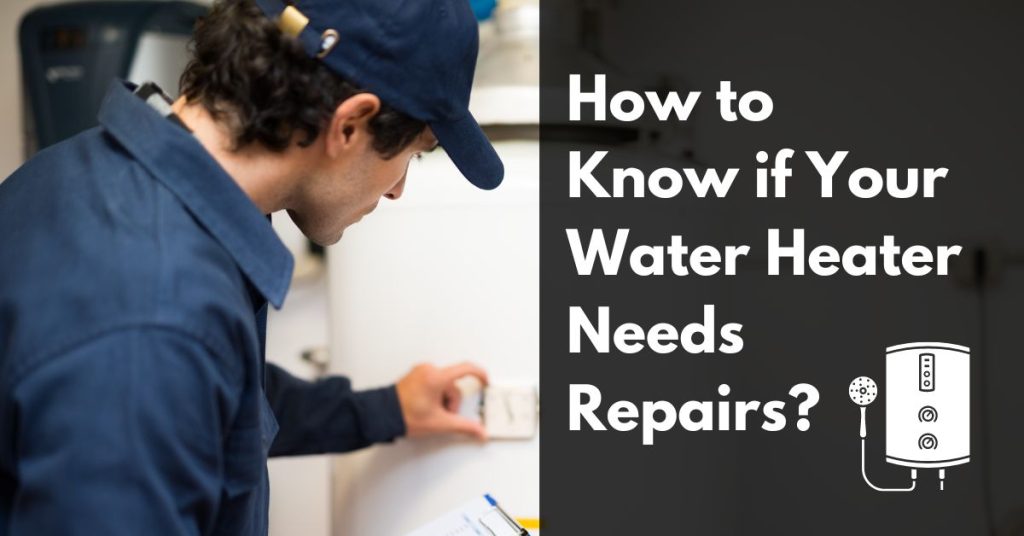Currently Empty: $0.00
How to Decide Between Water Heater Repair or Replacement?

A water heater is an essential appliance in most households that provides hot water for various daily activities, including bathing, cooking, and cleaning. Water heaters come in multiple types, such as tankless, electric, gas, and solar, and have different sizes and capacities to meet different household needs. While water heaters are generally reliable, they may experience malfunctions or wear and tear over time, leading to the need for water heater repair or replacement. In this blog, we will explore how to decide between water heater repair or replacement when faced with a malfunctioning or aging water heater.
Contents
- 1 What Are the Signs That Your Water Heater Needs Repair or Replacement?
- 2 Comparing the Cost of Repair Versus Replacement
- 3 What Are the Factors to Consider When Deciding Between Repair or Replacement?
- 4 The Role of Professional Inspection in Making a Decision
- 5 How to Select the Best Plumber for Water Heater Repair or Replacement?
What Are the Signs That Your Water Heater Needs Repair or Replacement?
There are several signs that may indicate that your water heater needs repair or replacement. These include
- Age: Most water heaters have a lifespan of around 10-15 years. If your water heater is approaching or exceeding this age, it may be time to consider a replacement.
- Rusty water: If your hot water has a rusty or metallic smell, it may indicate that your water heater tank is rusting and needs repair or replacement.
- Water leakage: If you notice water pooling around your water heater or dripping from the tank, it may indicate a leak that requires immediate attention from a professional.
- Strange noises: Popping, hissing, or banging sounds from your water heater may indicate mineral buildup or other issues needing repair.
- Inconsistent water temperature: If your hot water supply fluctuates or is consistently cooler than expected, it may indicate a problem with your water heater’s thermostat or heating element.
- Reduced hot water supply: If your water heater is producing less hot water than usual, it may be a sign that the unit is malfunctioning or has reached the end of its lifespan.
- Higher energy bills: If you notice a sudden increase in your energy bills without a clear explanation, it may indicate that your water heater is working harder than it should be due to malfunction or age.
Comparing the Cost of Repair Versus Replacement
When faced with a malfunctioning or aging water heater, one important factor is whether repairing or replacing the unit makes more financial sense. Here are some things to consider when comparing the cost of repair versus replacement:
- Age of the unit: As mentioned earlier, most water heaters have a lifespan of around 10-15 years. If your unit is older than this, it may be more cost-effective to replace it rather than repair it, as repairs may only provide a temporary fix.
- The extent of the damage: If the damage to your water heater is minimal, such as a faulty thermostat or heating element, repair may be a more affordable option than replacement. However, replacement may be more cost-effective if the damage is extensive, such as a leaking tank.
- The efficiency of the unit: Older water heaters may be less energy-efficient than newer models, leading to higher energy bills. If your unit is over ten years old and is not functioning at peak efficiency, replacing it with a newer, more energy-efficient model may be more cost-effective.
- Cost of repair: The repair cost varies depending on the extent of damage, the parts required, and the labor involved. If the repair cost is more than half that of a new water heater, replacement may be the more cost-effective choice.
- Warranty: If your water heater is still under warranty, repair may be more affordable, as the cost of parts and labor may be covered.
What Are the Factors to Consider When Deciding Between Repair or Replacement?
- Age of the unit: If your water heater is over ten years old, it may be approaching the end of its lifespan and may require more frequent repairs. In this case, replacing the unit altogether may be more cost-effective.
- The damage’s extent: The damage’s severity or malfunction should also be considered. Repair may be the best option if the problem is minor, such as a faulty thermostat or heating element. However, replacement may be necessary if the damage is extensive, such as a leaking tank.
- The efficiency of the unit: Older water heaters may be less energy-efficient than newer models, leading to higher energy bills. If your unit is over ten years old and is not functioning at peak efficiency, replacing it with a newer, more energy-efficient model may be more cost-effective.
- Cost of repair: The repair cost should be compared to the replacement cost. If the repair cost is more than half the cost of a new water heater, replacing the unit may be more cost-effective.
- Availability of replacement parts: If your water heater requires a specific part that is difficult to find or no longer available, replacement may be the only option.
- Long-term goals and budget: Your long-term goals and budget should also be considered when deciding between repair or replacement. If you plan to stay in your home for many years, a new, more energy-efficient water heater may save you money in the long run. However, repair may be more practical and affordable if you plan to move soon.
The Role of Professional Inspection in Making a Decision
When deciding whether to repair or replace your water heater, a professional inspection can play a critical role in making an informed decision. A licensed plumber or water heater technician can perform a thorough inspection of your unit to identify any problems and assess the overall condition of the unit.
During the inspection, the technician will check the age of the unit, the condition of the tank and heating elements, and the unit’s efficiency. They may also perform a pressure test to check for leaks, inspect the flue for proper ventilation, and check the electrical connections.
Based on their findings, the technician can provide a detailed assessment of the problem and recommend the most cost-effective solution. They can also provide you with an estimate for repair or replacement, including the cost of parts and labor.
A professional inspection can help you make an informed decision by clearly understanding the condition of your water heater and the cost of repair or replacement. It can also help you avoid making a costly mistake by replacing a unit that could have been repaired or repairing a unit that is beyond repair.
In summary, a professional inspection is an essential step in deciding whether to repair or replace your water heater, as it provides you with a detailed assessment of the problem and a recommendation based on the specific needs of your unit.
How to Select the Best Plumber for Water Heater Repair or Replacement?
When selecting a plumber for water heater repair or replacement, several factors must be considered to ensure that you choose the best professional for the job.
- Licensing and certification: It is important to choose a licensed and certified plumber with the necessary credentials and training to perform water heater repairs or replacements. Check with your state’s licensing board to verify their credentials.
- Experience: Look for a plumber with extensive experience repairing or replacing water heaters. Experienced plumbers will have a better understanding of the various types of water heaters and the most common issues that arise.
- Reputation: Check online reviews and ask for references to gauge the plumber’s reputation. A reputable plumber will have positive reviews and satisfied customers.
- Availability: Choose a plumber who can respond quickly to your needs. A water heater malfunction can cause significant inconvenience, and a prompt response can prevent further damage.
- Cost: Compare the cost of services from different plumbers to ensure that you get the best value for your money. Be wary of plumbers who offer unusually low prices, as this may indicate subpar service.
- Customer service: Look for a plumber who provides excellent customer service, clear communication, transparency, and a willingness to answer your questions.
- Warranty: Choose a plumber who offers a warranty on their work, as this provides added peace of mind and ensures that you are protected if any issues arise.
By considering these factors, you can select the best plumber for water heater repair or replacement, ensuring that your unit is repaired or replaced quickly and efficiently and that you receive the best value for your money.













